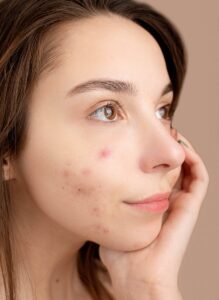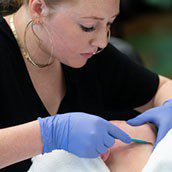Cameo College: Benefits of Acne Facials and Esthetician Treatments
Acne can be a frustrating and persistent skin condition that affects many individuals, regardless of age or skin type. When it comes to combating acne, utilizing proper skincare methods and treatments is crucial. This is where acne facials and esthetician treatments come into play, providing targeted solutions to help address and manage acne-related issues effectively.
Acne Facials and Treatments

Photo by Anna Nekrashevich on Pexels
Understanding acne and its causes is essential in implementing effective treatment plans. Acne is commonly caused by factors such as excess oil production, clogged pores, and the buildup of dead skin cells. These issues can lead to the formation of various types of acne, including blackheads, whiteheads, pimples, and more severe forms such as cystic acne.
Benefits of Acne Facials
Acne facials offer a range of benefits for individuals struggling with acne. These specialized facials typically involve thorough cleansing, exfoliation to remove dead skin cells, extractions to unclog pores, and targeted treatments to reduce inflammation and prevent future breakouts. Additionally, acne facials can help improve skin texture, tone, and overall appearance, leaving the skin looking clearer and healthier.
Effective Acne Treatments
For those dealing with inflamed or severe acne, seeking the expertise of a licensed esthetician is highly recommended. A licensed esthetician can assess the individual’s skin type and condition to develop a personalized treatment plan that may include chemical peels, targeted extractions, and the use of skincare products containing ingredients like benzoyl peroxide or sulfur. These treatments aim to reduce acne-causing bacteria, exfoliate the skin, and control excess oil production to promote clearer, healthier skin.
Role of Estheticians

Estheticians play a crucial role in the field of skincare, offering specialized treatments and expertise to help individuals address various skin concerns. They are trained professionals who understand the intricacies of different skin types and conditions, providing personalized solutions to improve skin health and appearance.
Importance of Estheticians in Skincare
Licensed estheticians are essential for effective skincare management, especially when dealing with issues like acne. Their knowledge of skincare products, treatments, and techniques allows them to develop tailored plans to target specific concerns and promote overall skin wellness. Estheticians can recommend suitable products, perform treatments like facials and peels, and offer guidance on maintaining a healthy skincare routine.
What to Expect from a Licensed Esthetician
When you visit a licensed esthetician for acne concerns, you can expect a comprehensive skin assessment to determine the underlying causes of your breakouts. Based on your skin type and condition, the esthetician may recommend a combination of treatments such as extractions, exfoliation, and the use of specialized products to address acne effectively. They will guide you on proper skincare techniques and provide ongoing support to help you achieve clearer, healthier skin.
When to See an Esthetician for Acne Concerns
If you are struggling with acne, especially inflamed or severe acne, scheduling a consultation with a licensed esthetician is advisable. Estheticians have the expertise to identify the best course of action for managing acne, whether through professional treatments, customized skincare routines, or product recommendations. By working with an esthetician, you can receive targeted care to address your acne concerns and improve the overall condition of your skin.
Skincare for Acne

Photo by Andrea Piacquadio on Pexels
Developing a comprehensive skincare regimen tailored for acne-prone skin is essential to effectively address and manage breakouts. Consistency is key when establishing a routine that includes gentle cleansing, non-comedogenic products, and targeted treatments to reduce inflammation and prevent future blemishes.
Tips for Clearing Acne and Achieving Clear Skin
Clearing acne and achieving clear skin requires a multifaceted approach. In addition to a consistent skincare routine, maintaining a healthy diet, managing stress levels, and avoiding aggravating factors such as touching your face can contribute to improved skin health. It’s also beneficial to stay hydrated, get sufficient sleep, and protect your skin from UV damage.
Scheduling an Appointment for Acne Treatment
When over-the-counter products are not providing the desired results, scheduling an appointment with a Cameo College student esthetician or dermatologist is recommended. These skincare professionals can assess your skin condition, recommend appropriate treatments such as chemical peels or extractions, and prescribe skincare products with active ingredients like benzoyl peroxide or sulfur to target acne effectively.
Frequently Asked Questions (FAQ’s)
1. What is acne?
Acne is a skin condition that occurs when hair follicles become clogged with oil and dead skin cells, leading to breakouts such as pimples, blackheads, and whiteheads.
2. How can a facial help with acne treatment?
A facial performed by a licensed esthetician can address specific skin types and create a customized treatment plan to help treat acne and improve overall skin health.
3. What happens during an acne treatment facial?
During an acne treatment facial, an esthetician may perform exfoliation, extraction of clogged pores, and apply topical treatments tailored to address acne-causing factors.
4. How do I know if I should see an esthetician for acne?
If you are struggling with acne and have not seen improvement with over-the-counter products, it may be time to visit a spa to see a licensed esthetician for personalized skin care recommendations.
5. What are some different types of acne?
Acne can range from inflamed acne like pimples and cysts to non-inflamed acne such as blackheads and whiteheads, each requiring specific skincare approaches.
6. Are chemical peels effective for treating acne?
Chemical peels are often used by estheticians to help exfoliate the skin, unclog pores, and improve overall skin texture and tone. During a chemical peel, a solution is applied to the skin that causes the top layers of skin to peel off, revealing fresh, new skin underneath.
There are several different types of chemical peels that vary in strength and ingredients, such as alpha hydroxy acids (AHAs), beta hydroxy acids (BHAs), and trichloroacetic acid (TCA). The type of peel used will depend on the individual’s skin type and concerns.
Chemical peels can help improve a variety of skin issues, including acne, hyperpigmentation, fine lines and wrinkles, and sun damage. They can also help to stimulate collagen production, leading to firmer, more youthful-looking skin.
It is important to consult with a skin care professional before undergoing a chemical peel, as they can determine the best treatment plan for your specific skin concerns and needs. It is also important to follow post-treatment care instructions to ensure optimal results and minimize the risk of complications.

